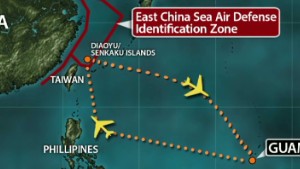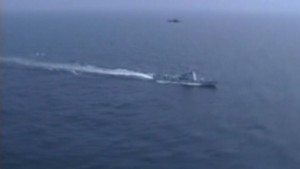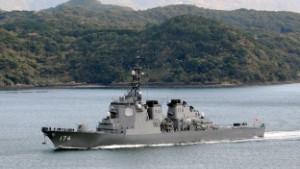China scrambles jets after U.S., Japanese planes fly through disputed zone
November 29, 2013 -- Updated 2023 GMT (0423 HKT)
STORY HIGHLIGHTS
- China says two U.S. military planes, 10 Japanese military planes entered disputed zone
- China has declared an air defense identification zone over the East China Sea
- This week, the U.S. and other nations defied China's demand that planes identify themselves
- The zone is part of a rapidly escalating dispute over East China Sea territory
(CNN) -- China scrambled fighter jets Friday morning after U.S. and Japanese military aircraft entered its newly declared air defense zone over the East China Sea, a Chinese military official said Friday.
Col. Shen Jinke, a Chinese air force spokesman, said in Beijing that the two U.S. and 10 Japanese aircraft were monitoring targets in the zone. He said the Chinese air force and navy were identifying and monitoring all foreign warplanes in the zone.
The incident marks a ratcheting up of tensions in the region that began last weekend, when Beijing declared the air defense identification zone over islands claimed by Japan and China.
Since then, several countries -- including the United States, South Korea and Japan -- have ignored the restrictions called for by Beijing.
A U.S. military official told CNN that at least one U.S. unarmed military aircraft and several Japanese military aircraft flew through the zone Friday without incident. The official said the U.S. flight was part of scheduled routine operations.




"This is status quo," the official said. "We are not changing what we are doing. We are not trying to make a point with China. We fly U.S. aircraft daily in international airspace in the region. This is normal."
The official said the aircraft were not B-52s, though the United States did fly two of the planes through the zone Monday as part of what the Pentagon described as a preplanned military exercise.
South Korea said its military sent a plane on a routine patrol flight into the zone Tuesday without alerting China. A South Korean Defense Ministry official said such flights are carried out twice a week and would continue despite China's declaration.
U.S. officials said they did not know how China would be able to monitor the flight zone, given its lack of midair refueling capability and limitations of its early warning radar aircraft.
"It is indeed the right of every country to defend its airspace, and also to make sure that its territorial integrity, its sovereignty, are safeguarded," Liu Jieyi, China's ambassador to the United Nations, told reporters Tuesday. "This is a normal arrangement."
On Wednesday, U.S. Ambassador to Japan Caroline Kennedy offered a different view: "Unilateral actions like those taken by China, with their announcement of an East China Sea air defense identification zone, undermine security and constitute an attempt to change the status quo in the East China Sea," she told reporters in Tokyo. "This only serves to increase tensions in the region."
Japan signaled its rejection of Beijing's move Thursday, with Chief Cabinet Secretary Yoshihide Suga telling reporters his country's Self Defense Force was continuing surveillance patrols of disputed territory in the East China Sea just as it had before China's declaration.
Two major Japanese airlines have refused to comply with China's declaration.
Japan and China have a lot at stake in maintaining their delicate relationship: Last year, trade between the two countries totaled more than $333 billion, according to the Japan External Trade Organization.
CNN's Barbara Starr, Tim Hume, Jethro Mullen and Yoko Wakatsuki contributed to this report.
We recommend
From around the web
‘Hostile’ aircraft could be shot down in new air zone: Chinese air force general(South China Morning Post)
November 27, 2013 -- Updated 0412 GMT (1212 HKT)
Two U.S. military aircraft flew into China's newly claimed and challenged air defense zone over the East China Sea, a U.S. official said, an action that could inflame tensions between the world powers.
November 27, 2013 -- Updated 0715 GMT (1515 HKT)
Tensions magnified among the world's top three economies over China's controversial new air defense zone.
CNN looks at the main flashpoints as tension simmers between rival countries over a series of scattered and relatively barren islands.
November 27, 2013 -- Updated 0024 GMT (0824 HKT)
CNN's David McKenzie reports from Beijing on why the Chinese claim sovereignty over an area in the East China Sea.
November 1, 2013 -- Updated 0042 GMT (0842 HKT)
Surprise, surprise, Japan and China are still not getting along, writes Jeff Kingston of Temple University in Japan.
October 25, 2013 -- Updated 0935 GMT (1735 HKT)
Japan is using YouTube to bolster assertions of ownership over islands also claimed by neighboring China and South Korea.
August 6, 2013 -- Updated 0100 GMT (0900 HKT)
In "Glorious Mission Online," China's first online game co-developed by the People's Liberation Army and released to the public, players join the ranks of the country's military to take on the enemy.
April 24, 2013 -- Updated 1016 GMT (1816 HKT)
The fragile relationship between China and Japan came under fresh strain Tuesday as ships from both sides crowded into the waters around a disputed group of islands and nearly 170 Japanese lawmakers visited a controversial war memorial.
April 8, 2013 -- Updated 1753 GMT (0153 HKT)
Sightseeing cruises to China's newest city, Sansha, located on a disputed island in the South China Sea, are set to commence this month, a Chinese official said.
America's power and purpose are in jeopardy if the world's three largest economies cannot step back from the brink, writes Patrick Cronin.
November 15, 2012 -- Updated 0854 GMT (1654 HKT)
China uses perceived provocations as a chance to change the status-quo in its favor, writes Stephanie Kleine-Ahlbrandt.
Most Popular
Today's five most popular stories
60°
HI 55°LO 31°
Atlanta, GAWeather forecast
Home | Video | World | U.S. | Africa | Asia | Europe | Latin America | Middle East | Business | World Sport | Entertainment | Tech | Travel | iReport
Tools & Widgets | RSS | Podcasts | Blogs | CNN Mobile | My Profile | E-mail Alerts | CNN Shop | Site map | CNN Partner Hotels






























No comments:
Post a Comment